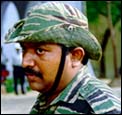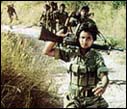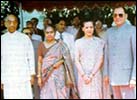The Rediff Special/J N Dixit
' "I am still the president. I shall not be dictated to by a separatist militant group on every detail of how I should run the administration of a part of my country" '
 The only document which Prabhakaran formally authorised for signatures by the LTTE in relation to the Indo-Sri Lanka Agreement. Reproduced in full:
The only document which Prabhakaran formally authorised for signatures by the LTTE in relation to the Indo-Sri Lanka Agreement. Reproduced in full:
The High Commissioner informed Mr V Prabhakaran that President Jayewardene has agreed to establish an Interim Administrative Council for the Northern and Eastern Provinces, as per the following composition:
(a) Chief Administrator/Administrator in Council--One of the three persons included in the list submitted by the LTTE to be appointed:
(i) LTTE -- 5
(ii) TULF -- 2
(III Muslims -- 2 (to include one LTTE nominee)
(iv) Sinhalese -- 2
--------
Total 12
------
Prabhakaran agreed to the composition of the Interim Administrative Council as indicated above.
High Commissioner Shri J N Dixit informed Prabhakaran that President Jayewardene had agreed to delegate his executive powers, as envisaged in paras 10.1 and 10.2 of the Bangalore proposals, to the Administrator in Council during the interim period, ie, till elections to the provincial councils are held.
The administrator in council would accordingly be responsible for the maintenance of law and order and other responsibilities as outlined in the relevant paragraphs.
It was agreed that the establishment of an interim administration would facilitate the fulfilment of the five demands put forward by the LTTE in its resolution conveyed on 13 September, 1987 to the high commissioner.
Prabhakaran said the LTTE would fully co-operate in the implementation of the Indo-Sri Lanka agreement subject to assurances given to him by the prime minister of India in July 1987.
Prabhakaran said the LTTE would surrender the remaining arms, ie, other than the personnel arms for the security of their leaders, once conditions of security for their leaders and cadres are created.
Prabhakaran agreed that the LTTE will co-operate fully and ensure smooth functioning of all aspects of the civil administration including the functioning of the police force.
Prabhakaran agreed that free and fair elections to the provincial council will be held and that the LTTE will co-operate fully in the process.
High Commissioner Shri Dixit and Prabhakaran agreed that the LTTE and Indian official media would desist from mutual criticism.
In view of the agreement having been reached on paras 2 to 11 above, the Sri Lankan government will announce the establishment of the interim administrative council within 48 hours of the signing of the agreed minutes.
It was also agreed that the Government of India and Sri Lanka will formally announce the salient points of the above agreement.
Upon this being done, the LTTE would make an announcement about the withdrawal of its agitation and fasting unto death campaigns.'
 One significant point of this agreement needs emphasis. Out of the 12 members of this proposed interim governing council, six were to be members of the LTTE, including the chief administrator. The LTTE was also to nominate one out of 2 TULF representatives. The other suggestion was that if other Tamil groups wanted to come in, one nominee from the TULF in consultation with the LTTE and another one could jointly represent all the other groups.
One significant point of this agreement needs emphasis. Out of the 12 members of this proposed interim governing council, six were to be members of the LTTE, including the chief administrator. The LTTE was also to nominate one out of 2 TULF representatives. The other suggestion was that if other Tamil groups wanted to come in, one nominee from the TULF in consultation with the LTTE and another one could jointly represent all the other groups.
The LTTE clarified that out of its five direct nominees, one may be from EROS. The LTTE was also to nominate one out of two Muslim representatives proposed for the interim governing council. In effect, the LTTE was to have a majority of eight, if not nine, in this proposed Interim Council of 12. Their other demands for the delegation of powers were generally met but not in full measure.
Jayewardene repeated his offer to make Prabhakaran the chief administrator of the north-eastern provinces. And said that if Prabhakaran accepted the responsibility he would not insist on a panel of nominees for the post of the chief administrator. I conveyed Prabhakaran's refusal to accept this responsibility to Jayewardene.
I interrupted the proceedings of the meeting with Prabhakaran on September 26 to convey my deep condolences on Thileepan's passing away. During the course of these remarks, I said that given the progress made in the creation of the interim government, it was a pity that a valuable life (of Thileepan) was lost. As far as I recall, Prabhakaran said that while Thileepan shared the objectives of the agreement he was quite perturbed about the delay in its implementation and that he had died for his convictions, in keeping with the creed of the LTTE.
I recalled to Prabhakaran that though I myself was reluctant to go personally to Thileepan, I had agreed to send two of my senior colleagues to make a request to him to break the fast. Prabhakaran said that would not have served the purpose. The request had to be made personally by me. And it should not have been conditional to Thileepan accepting my request. I did not respond to this comment.
As a follow-up to signing the agreed minutes, the LTTE suggested three names for the post of chief administrator. I remember two names out of the three. They were N Padhmanathan, former assistant government agent in Batticaloa and C V K Sivagnanam, municipal commissioner of Jaffna. I do not recall the third name.
I returned from Jaffna with these names, and the agreed minutes. Prabhakaran had told me that he desired the process of implementation of the proposals in the agreed minutes to commence within 48 hours of my return to Colombo. I called on Jayewardene within an hour of my return on September 28 when he chose Sivagnanam to be the chief administrator.
He asked me to get the names of all other members of the interim governing council from the LTTE as early as possible so that he could issue the official order establishing the interim council. I returned home and rang up General Harkirat Singh in Jaffna and told him to convey the decision of the president to appoint Sivagnanam out of the panel suggested by the LTTE. I also asked General Harkirat Singh to get the names of the other members for the proposed interim government.
Balasingham called me around midnight to tell me that Prabhakaran did not accept Jayewardene's decision to appoint Sivagnanam. Prabhakaran wanted Padhmanathan to be nominated the interim administrator and that Padhmanathan was the only choice of the LTTE. When I told Balasingham that it was Prabhakaran himself who had suggested a three-name panel, on the basis of which I negotiated with Jayewardene, Balasingham said that the three names given by the LTTE were in order of priority. And since Padhmanathan was the first one Jayewardene should appoint him. I conveyed my impression to Balasingham that Jayewardene was not going to accept this kind of diktat. I, however, promised to try to persuade Jayewardene to nominate Padhmanathan.
I went back to Jayewardene the next day to inform him of the LTTE's new suggestion regarding the appointment of the chief administrator. Jayewardene told me that under no circumstances would he appoint Padhmanathan, since as assistant government agent in Batticaloa, he had helped a large number of Tamil militants escape from jail. He could not be seen appointing an officer who had violated his own oath of loyalty to the government as the new chief administrator of the north-eastern provinces.
 Jayewardene also drew my attention to the fact that he had issued orders between September 23 and 28, granting general amnesty to Tamil militants which covered all the cadres of the LTTE, including Prabhakaran. He also pointed out that he had ordered the release of all political and a large number of other detenues against whom criminal charges were pending. He said that he had done this in fulfilment of the spirit and objectives of the Indo-Sri Lanka agreement. He was therefore quite agitated about the LTTE's change of mind.
Jayewardene also drew my attention to the fact that he had issued orders between September 23 and 28, granting general amnesty to Tamil militants which covered all the cadres of the LTTE, including Prabhakaran. He also pointed out that he had ordered the release of all political and a large number of other detenues against whom criminal charges were pending. He said that he had done this in fulfilment of the spirit and objectives of the Indo-Sri Lanka agreement. He was therefore quite agitated about the LTTE's change of mind.
He said: "I might have made compromises in the larger interests of the country. But I am still the president. I shall not be dictated to by a separatist militant group on every detail of how I should run the administration of a part of my country." I pleaded with him to relent, but to no avail."
I rang up the IPKF headquarters in Jaffna and conveyed Jayewardene's insistence on Sivagnanam being the chief administrator, and his stipulation that nomination for the interim government should reach him as quickly as possible. The message I got on the morning of September 30 said that the LTTE would not send in their nominations for the interim government nor participate in it till Padmanathan was made the chief administrator.
The entire process of establishing an interim government in the north-eastern provinces in preparation for holding elections there and establishing a regular provincial council and a Tamil government went off into a spin. The fat was in the fire.
Excerpted from Assignment Colombo, by J N Dixit, Konarak Publishers, 1998, Rs 400, with the publisher's permission.Readers interested in obtaining a copy of the book may direct their enquiries to Mr K P R Nair, Konarak Publishers, A-149, Main Vikas Marg, New Delhi 110 001.
Tell us what you think of this feature
|



